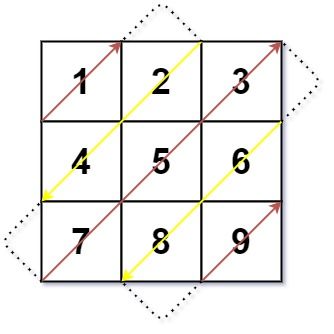
Description
Given an m x n matrix mat, return an array of all the elements of the array in a diagonal order.
Example 1:

Input: mat = [[1,2,3],[4,5,6],[7,8,9]]
Output: [1,2,4,7,5,3,6,8,9]
Example 2:
Input: mat = [[1,2],[3,4]]
Output: [1,2,3,4]
Constraints:
m == mat.lengthn == mat[i].length1 <= m, n <= 1041 <= m * n <= 104-105 <= mat[i][j] <= 105
Solutions
Solution 1
1
2
3
4
5
6
7
8
9
10
11
12
13
14
15
16 | class Solution:
def findDiagonalOrder(self, mat: List[List[int]]) -> List[int]:
m, n = len(mat), len(mat[0])
ans = []
for k in range(m + n - 1):
t = []
i = 0 if k < n else k - n + 1
j = k if k < n else n - 1
while i < m and j >= 0:
t.append(mat[i][j])
i += 1
j -= 1
if k % 2 == 0:
t = t[::-1]
ans.extend(t)
return ans
|
1
2
3
4
5
6
7
8
9
10
11
12
13
14
15
16
17
18
19
20
21
22
23
24
25 | class Solution {
public int[] findDiagonalOrder(int[][] mat) {
int m = mat.length, n = mat[0].length;
int[] ans = new int[m * n];
int idx = 0;
List<Integer> t = new ArrayList<>();
for (int k = 0; k < m + n - 1; ++k) {
int i = k < n ? 0 : k - n + 1;
int j = k < n ? k : n - 1;
while (i < m && j >= 0) {
t.add(mat[i][j]);
++i;
--j;
}
if (k % 2 == 0) {
Collections.reverse(t);
}
for (int v : t) {
ans[idx++] = v;
}
t.clear();
}
return ans;
}
}
|
1
2
3
4
5
6
7
8
9
10
11
12
13
14
15
16
17 | class Solution {
public:
vector<int> findDiagonalOrder(vector<vector<int>>& mat) {
int m = mat.size(), n = mat[0].size();
vector<int> ans;
vector<int> t;
for (int k = 0; k < m + n - 1; ++k) {
int i = k < n ? 0 : k - n + 1;
int j = k < n ? k : n - 1;
while (i < m && j >= 0) t.push_back(mat[i++][j--]);
if (k % 2 == 0) reverse(t.begin(), t.end());
for (int& v : t) ans.push_back(v);
t.clear();
}
return ans;
}
};
|
1
2
3
4
5
6
7
8
9
10
11
12
13
14
15
16
17
18
19
20
21
22
23
24
25
26
27
28 | func findDiagonalOrder(mat [][]int) []int {
m, n := len(mat), len(mat[0])
var ans []int
for k := 0; k < m+n-1; k++ {
var t []int
i, j := k-n+1, n-1
if k < n {
i, j = 0, k
}
for i < m && j >= 0 {
t = append(t, mat[i][j])
i++
j--
}
if k%2 == 0 {
p, q := 0, len(t)-1
for p < q {
t[p], t[q] = t[q], t[p]
p++
q--
}
}
for _, v := range t {
ans = append(ans, v)
}
}
return ans
}
|
1
2
3
4
5
6
7
8
9
10
11
12
13
14
15
16
17
18
19
20
21
22
23
24
25
26
27
28
29
30
31
32
33
34
35 | function findDiagonalOrder(mat: number[][]): number[] {
const res = [];
const m = mat.length;
const n = mat[0].length;
let i = 0;
let j = 0;
let mark = true;
while (res.length !== n * m) {
if (mark) {
while (i >= 0 && j < n) {
res.push(mat[i][j]);
i--;
j++;
}
if (j === n) {
j--;
i++;
}
i++;
} else {
while (i < m && j >= 0) {
res.push(mat[i][j]);
i++;
j--;
}
if (i === m) {
i--;
j++;
}
j++;
}
mark = !mark;
}
return res;
}
|
1
2
3
4
5
6
7
8
9
10
11
12
13
14
15
16
17
18
19
20
21
22
23
24
25
26
27
28
29
30
31 | impl Solution {
pub fn find_diagonal_order(mat: Vec<Vec<i32>>) -> Vec<i32> {
let (m, n) = (mat.len(), mat[0].len());
let (mut i, mut j) = (0, 0);
(0..m * n)
.map(|_| {
let res = mat[i][j];
if (i + j) % 2 == 0 {
if j == n - 1 {
i += 1;
} else if i == 0 {
j += 1;
} else {
i -= 1;
j += 1;
}
} else {
if i == m - 1 {
j += 1;
} else if j == 0 {
i += 1;
} else {
i += 1;
j -= 1;
}
}
res
})
.collect()
}
}
|

